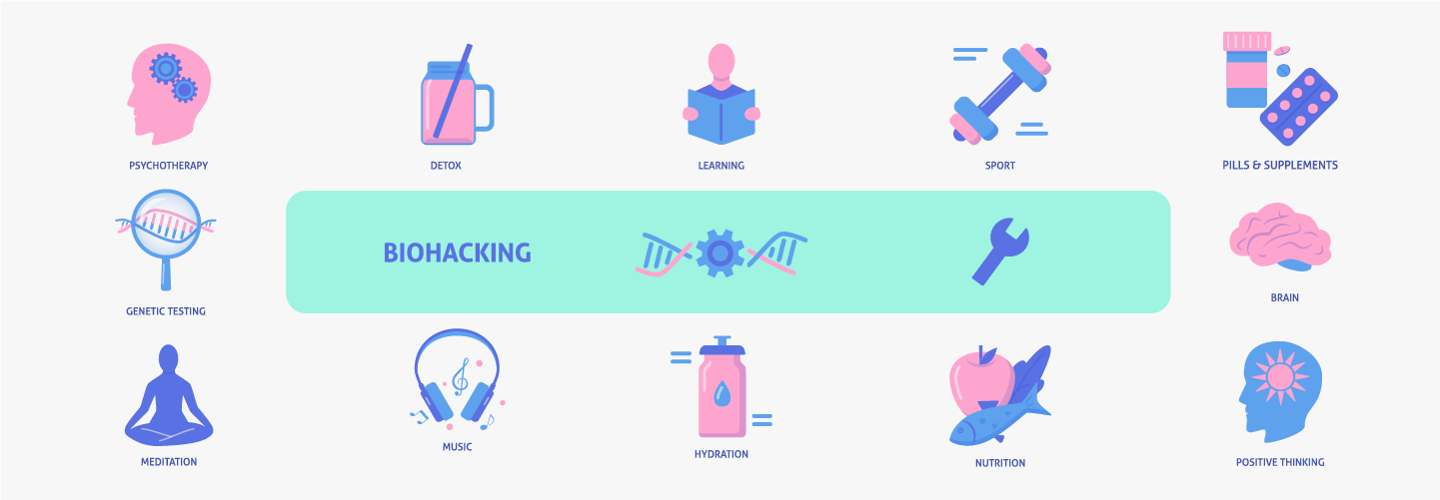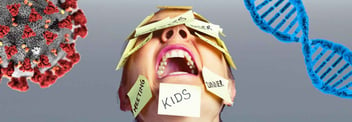The DNA of Emotional Health – Part 2 Biohacking Your Genes by Altering Your Environment
- Home
- Blog

“Every ‘genetic illness’ is a mismatch between an organism’s genome and its environment. In some cases the appropriate medical intervention to mitigate a disease might be to alter the environment.”
– Siddhartha Mukherjee, M.D.
Reader, what would you give to know your future, and be able to alter the outcome? It’s a fantasy so dear to so many of us that it’s almost too hard to wrap our minds around it. I can’t count how many times I’ve heard some iteration of the same question from patients in my office: If I could just know how this will turn out. If I could just be certain I’ll be alright. Uncertainty is so potently terrifying to so many of us that we unconsciously erect barriers and boundaries to limit our conscious awareness. Belief in a higher power is one way to bring ourselves comfort in the face of life’s uncertainties. Many of the decisions we make in life feel significant because of the assumed certainty they provide for us and our futures: buying landed property, getting married, moving to states or countries with greater opportunity, having children. Of course, deep down, we all know the dreaded reality: even if we gave a million dollars to know our future, an honest fortune teller would whisper the same words to each of us: “It depends.”
Our fates are determined by so many factors, both known and unknown—and yet even uncertainty has its constraints. As just one example, we may think there are a million fish in the sea—(and as many possible life partners)—when we are children. Yet as we mature, we begin to understand our own preferences and tastes and desires. We may never be able to predict our futures with certainty, but the more we can understand the laws of nature and life itself, and how the world and our bodies work, the more we can understand what lies within our control and what does not. Today, I want to dig into the ways in which this truth operates in our bodies and minds at a genetic level—and how the field of epigenetics may hold intriguing clues as we explore the DNA of our emotional health.
Epigenetics, Fate, and the Certain Uncertainty of our Genetic Code
From a biological standpoint, it would seem that our personal genome would be the most certain thing about us: our conscious lives may shift, but surely our DNA and its expression are set in stone. It’s easy to be fooled by this assumption—after all, certain things don’t change in our physical makeup, like our eye color or skin tone. However, the science of genetics simply does not support this assumption. We now understand that even at the level of our DNA, real variance can occur. Thanks to epigenetics and the epigenome, certain molecular mechanisms inside the 32 trillion cells in our bodies can be turned off or on based on triggers found in our environment (for example, our diet). In another example, we may have a gene variant that predisposes us to opioid abuse, like OPRM1. But if we are never exposed to opioids, this variant is never triggered into action. Similarly, we may have a gene variant that predisposes us to depression given certain epigenetic modifiers—take SLC6A4 for instance – which under conditions of adversity will predispose one to higher rates of developing depression. The environment in which we inhabit may never turn that switch on for us. But if it does, understanding this genetic component of emotional health and illness equips you to manage your emotional states with far greater precision than you’d have if you never knew you were predisposed in the first place. In other words, through knowledge of your personal emotional genome, you may not be able to control ALL future epigenetic influencers, but you may be able to alter MANY of them to achieve and maintain good emotional health, arguably the root of all genuine happiness.
As we move forward in our new blog series on the DNA of Emotional Health, it is absolutely critical that you gain an understanding of the role of epigenetic influences on our genetic code—and the ways in which our environment can change the expression of our DNA. To help illustrate this field of study, I encourage you to watch the video below—and to read the patient story that follows, which provides a real-world example of epigenetics at play.
Monica’s Story: Why Environment Plays a Crucial Role in Our Genetic Expression and Emotional Health
Monica* came into my office and sat down, furtively looking around, twitching, and filled with agitation. She was on the verge of tears as she told me her story. “Dr. Kehr, I am a cancer survivor and now it has returned after 8 years – it’s Stage 2B. I am so scared I am going to die, and don’t know what to do. I am having anxiety attacks and panic attacks, and have become dependent on Xanax and don’t think I can come off it, yet it makes me groggy and foggy-brained. Because of my cancer, I don’t want any more prescription drugs, I only want to go the natural route. And then there’s my 14 year old daughter, Robin, who I’m convinced is part of the reason why I got sick again. Living with her is so stressful, I think it affected my immune system and brought back my cancer, can you help me?”
My heart went out to her. She was just finishing up her immunotherapy for recurring ovarian cancer, and was about to begin radiation treatments. She had lost all of her hair and was wearing a wig. Her anxiety and fear were palpable. I asked her to tell me more about Robin. “Dr. Kehr, I adopted Robin years ago from a Russian orphanage. She was trouble right from the beginning, oppositional, defiant, keeping an emotional distance, and inconsolable. I am convinced she was abused as an infant, and never formed loving attachments to anyone before she arrived at our home, or any time since. Now that she is in her early teens, she is involved with drugs, and I believe that she has had sex with a number of boys. Several times her friends have told me that she near-overdosed at parties on alcohol and pills. I have had her in therapy for years, with a number of different therapists that she keeps firing. And she refuses to take medications. Now that my cancer has returned, I am not sure I can take much more of this.”
This highly intelligent, sensitive, and thoughtful woman had already assembled an impressive medical team including an internist, surgical and medical oncologists, a nutritionist, and a functional medicine specialist. I was about to add even more complexity to her treatment regimen, as both her anxiety and her daughter Robin were crippling her and consuming her heart and soul—but I felt confident that our work together would offer the relief she so desperately needed.
Based on what Monica had told me, I could already see the way her environment may be playing a role in both her mental health and her physical health, including the effects of prolonged elevated levels of cortisol on mammary glands in the breast tissue and increased levels of estrogen production as well. Chronic stress is also associated with tumor metastasis and weakened immune system functioning. These effects come from a prolonged “fight, flight or freeze response” (the so-called HPA – hypothalamic/pituitary/adrenal axis) which releases cortisol and adrenaline from the adrenal glands. Based on my knowledge of epigenetics and the way our gene variants can be turned on or off based on our environment, it was important to look at both the genetic and the environmental elements of Monica’s personal stress response and determine a plan.
“Monica, here’s what I believe we should do. I am going to order some blood studies to look for possible metabolic, infectious, or endocrine causes of your anxiety and panic symptoms, and to develop a better idea of how to treat them will order both the Professional PGx and Mindful DNA genetic assays. We will review them and develop a game plan to ease your emotional pain using diet and supplement interventions which I will coordinate with your functional medicine doctor and nutritionist. We will then begin to address how you can reduce the stress being caused by Robin, and look at other ways to help your immune system become stronger. Do you agree to this plan?”
Monica did agree this was the best course of action—and what we discovered was most interesting.
How Our Environment Impacts Our Genes—And How We Can “Biohack” Emotional Health
Monica’s genetic tests revealed a number of variants that predisposed her to an exaggerated stress response to life stressors. In other words, it was not one, specific, fateful gene that predetermined Monica’s stress levels—it was how life stress interacted with her genes to bring about chronic high levels of anxiety, cortisol and adrenaline! These responses in turn resulted in a higher likelihood of immune system suppression and cancer reoccurrence and metastasis—reader, this is why it is so important to understand how your environment is working with or against your genes.
Monica had a number genes that contributing to her outcomes: SLC6A4 S/S, COMT Met/Met, and OXTR (three “orchid genes”), MTHFR which manufactures key neurotransmitters to regulate mood and anxiety, CACNA1C which brings about increased brain cell excitability, and FKBP5 and CRHR1 which cause excessive and prolonged activation of the HPA axis.
Armed with this information, and after consulting with her other physicians and nutritionist, we initiated Omega 3 (to address her CACNA1C variant), Methylfolate (for MTHFR), N-acetylcysteine (for COMT, FKBP5 and CRHR1 variants) , and low-dose Naltrexone (to help improve her mood and reduce inflammation related to her cancer therapy). These interventions began to interact with her DNA to alter her “cellular environment” in a favorable direction to make up for the negative impacts of her environmental stressors. We slowly weaned her off Xanax as we induced these medications, and she began to feel some symptomatic relief at the end of the first month.
Adjusting how your genetic variations express themselves, with prescription medications and supplements, can go a long way toward counteracting other, more uncontrollable factors in your environment. Yet sometimes the most effective “gene therapy” is an epigenetic modification of the external environment, in this case helping Monica deal with her chronic stress caused by Robin. Over the next few months, she and her husband began sessions with me, where the more I learned the more I believed that both Monica and Robin would be best-served by placing Robin in a residential treatment center. One month after Robin was placed, Monica’s stress level has really begun to subside. We are dealing with her guilt over “abandoning my daughter” which is a common feeling, but now Monica can devote all of her energy to working with her doctors to put her reoccurring cancer into remission. In our first session she felt utterly hopeless. In a recent session, some hopefulness has begun to return, to help lift her out of the darkest phase of her life.
Related Information
- Learn about Genetic Testing
- Learn about Potomac Psychiatry
- Meet Our Doctors
- Contact Potomac Psychiatry
.png?width=144&height=144&name=Untitled%20design%20(34).png)



